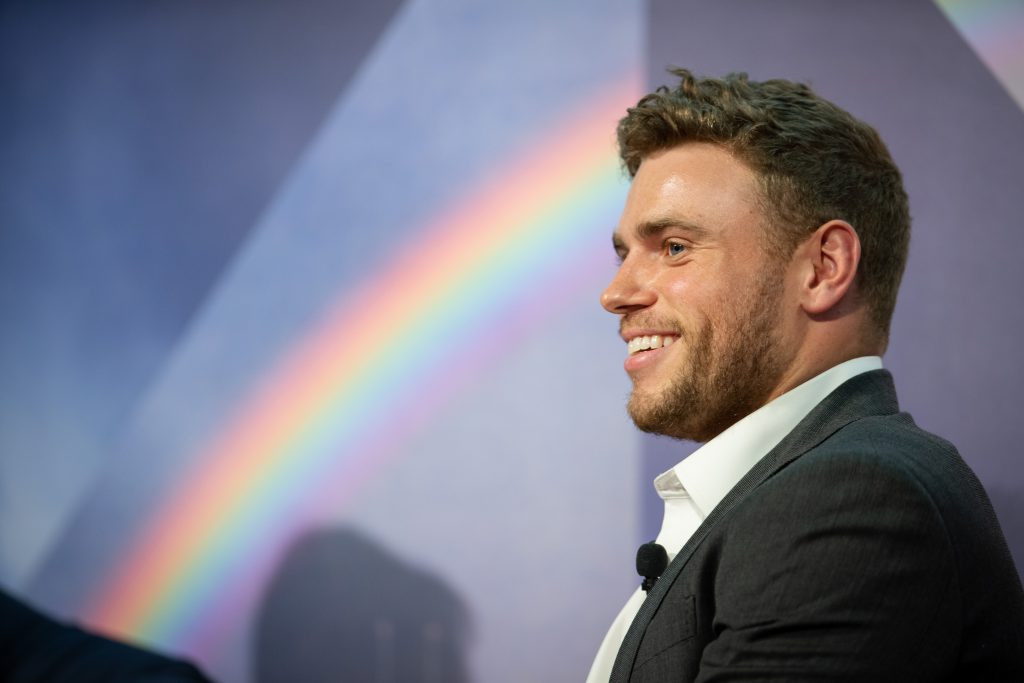LGBT+ Olympic medalist Gus Kenworthy spoke at Out Leadership’s 2018 Australia OutNEXT Salon, hosted by Bloomberg and presented by global OutNEXT sponsors Barclays and PwC, and at Out Leadership’s 2018 Asia summit, sponsored by EY, KPMG, HSBC, and Thomson Reuters.
Out Leadership founder and principal Todd Sears interviewed Gus about his inspiring coming out story and the importance of visible leadership.
Gus spoke about his experience medaling at the Sochi Olympics while still in the closet:
“Our wins represented the third Olympic sweep in US history, so they made a pretty big deal about it. We were three young guys, and the other two guys were single—I was in the closet so as far as they were concerned I was also single. The day after I won was Valentine’s Day and it was the beginning of our press tour. All that anyone wanted to know was ‘Who is your celebrity crush?’, or ‘What’s your type of girl?’, ‘What’s an ideal date?’, and suddenly I was lying in national interviews. It put me in a really dark place.
The aftermath of winning an Olympic medal should be your happiest moments as an athlete, it should be the highlight of your life, but I think it was probably the lowest point of my entire life. I was lying every day, in multiple interviews a day, and really felt terrible about myself—I wasn’t living my life authentically, not being who I wanted to be. I wanted to come out but I also didn’t want to come out impromptu on the Today show.”

Gus went on to explain the difficulty of the following season as he struggled with being in the closet, both emotionally and in his sport:
“I had a breakdown after one of the events and I called my agent, who was the only person who knew at the time. I told him that I wanted to quit skiing cause I didn’t want to be in the sport anymore where I didn’t feel like I could be myself and I didn’t feel like I could be accepted and loved. And I just wanted to live my life as a gay man. I wanted to be able to go out and date and not feel ashamed, and not have to hide, and not feel judged and criticized.
And I really have to credit him—he told me, ‘You know dude, you can come out. You have nothing to prove to anybody. You’ve done all that can do in the sport. If you want to be out, you can do that while you’re still competing. You don’t have to wait until it’s over. I know it’s scary and no one’s done it, but you’re the guy that could do that.’
I listened to that and I thought a lot about it and I decided that I was gonna finish the season, I was gonna get back to number one and was gonna come out after the season.”
“I finished the year as the world champion and reached out to a reporter who I really trusted at ESPN and told that I wanted to come out on the cover of ESPN. I knew that I wasn’t the only person in my position, I wasn’t the only gay guy from a small town who didn’t feel like he belonged, who didn’t see anybody else that was like him. I knew I wasn’t the only gay person in action sports and I wanted to be able to connect with those people and help someone else who was like me. Ultimately, I wanted to do the thing I thought I needed most.”
Gus was met with incredible support from family, friends and fans. At the 2018 Pyeongchang Olympics, he and his boyfriend shared the first televised same-sex kiss in Olympic history.
“At the time I didn’t think about it at all but now with hindsight I realize it was kind of amazing because that kiss was broadcast into television sets across the world, in countries where homosexuality is illegal, punishable by law, punishable by death. Those people watching the winter Olympics saw that gay kiss. I think that it hopefully gave hope to a lot of people. ‘Cause I know, if I had been a kid and I had seen two guys kiss after a sporting event I think it would have cemented the fact that I could exist in sports.”